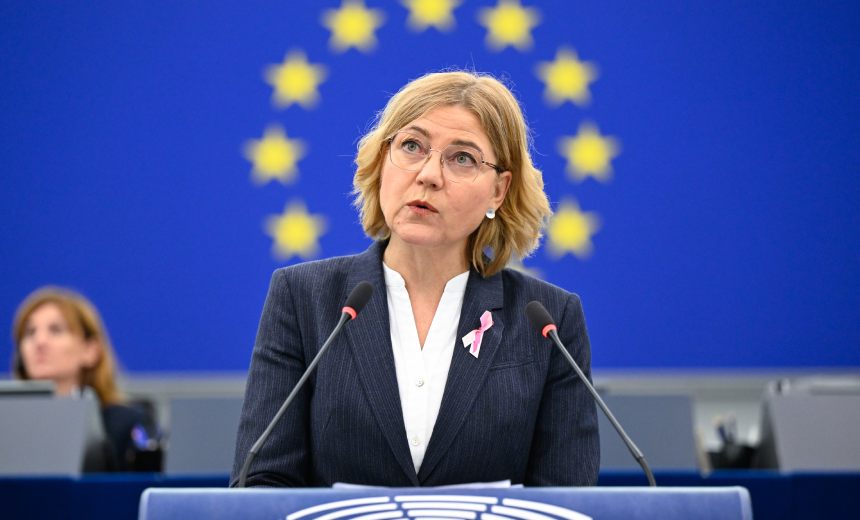Artificial Intelligence & Machine Learning
,
Next-Generation Technologies & Secure Development
AI Strategies Seeks to Bolster Its Position in the Global AI Race
Akshaya Asokan (asokan_akshaya) •
October 8, 2025

Henna Virkkunen, European commissioner for technological sovereignty, security and democracy, during an Aug. 10, 2025 European Parliament session on European sovereignty. (Image: Philippe Stirnweiss/European Union)
The European Union is pledging 1 billion euros to boost a continental vision of artificial intelligence amid mounting fears the trading bloc is falling behind on research and adoption into the cutting edge technology.
See Also: OnDemand | Navigate the threat of AI-powered cyberattacks
The European Commission on Wednesday published two frameworks, the Apply AI Strategy and the AI in Science Strategy, that are designed to put “Europe at the forefront of AI-driven science.”
“With these strategies, we will help speed up the process. Putting AI first also means putting safety first,” said European Commission President Ursula von der Leyen. “We will drive this AI first mindset across all our key sectors from robotics to healthcare, energy and automotive.”
Europe has long resented its status as a customer of U.S. -and now, increasingly, Chinese – digital technology rather than taking shape as a global innovator, a position that’s led it to push for greater “technological sovereignty.” Systemic challenges include low research and development levels, a lack of semiconductor manufacturing and risk-adverse investors. Despite hosting four supercomputers, the commission estimates it holds less than 5% of global computational power, compared to 75% for the United States and 15% for China. To lead in AI, the trading bloc must invest in domestic infrastructure and solutions, the commission said.
Under the Apply AI Strategy, the commission will allocate 1 billion euros – approximately $1.16 billion – to promote AI in healthcare, energy, mobility, manufacturing and construction. The strategy also seeks to accelerate product development and market deployment, as well as strengthen AI skills.
As part of the AI in Science Strategy, the commission announced the creation of a virtual institute dubbed “Resource for AI Science” that will coordinate AI research and promote its use across scientific fields.
These new initiatives will drive “AI to deliver real benefits for EU citizens, reinforce our competitiveness and strengthen our technological sovereignty,” said Henna Virkkunen, tech sovereignty commissioner.
The European Union is the world’s largest political entity to have instituted a comprehensive regulation over AI. Critics argue the AI Act stifles innovation and pushes European talent abroad (see: EU Pledges ‘No Pause’ Over Enforcement of Bloc’s AI Act).
“Why is it so difficult to get AI done in Europe? Simply because we started with regulating, to keep AI under the thumb,” said Roger Dassen, chief financial officer of Dutch semiconductor giant ASML said on Monday, reported Politico. “Someone with talent in AI, the first thing they do with their hard-earned money is buy a ticket to Silicon Valley.”
The agency on Wednesday said the regulation, backed by its latest assistance, will promote strong collaborations among EU and tech companies to improve AI safety, security and trustworthiness.
Proponents of the regulation say governance initiatives will play a crucial role in ensuring transparency and accountability in AI systems, which have long faced criticism for opaque data practices and potential copyright violations.
“The AI ecosystem is built on layers of opacity,” said Maximilian Gahntz, AI policy lead at the Mozilla Foundation. “There’s very little information about what data is used to train AI models. The AI Act presents the best chance to shine a light on this crucial aspect and illuminate at least part of the black box.”